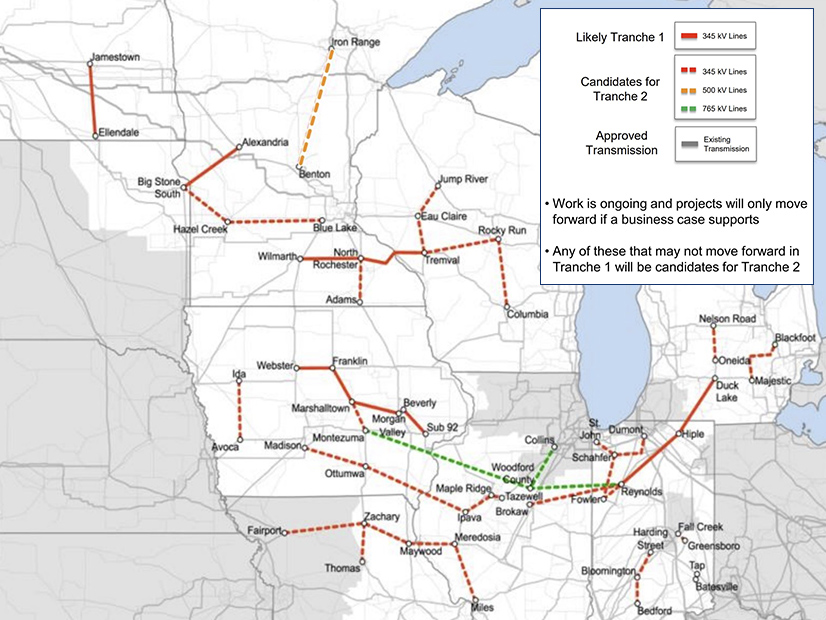MISO last week said it probably won’t meet a March deadline to gain approval of its long-range transmission plan’s first projects, saying the Board of Directors’ action will likely be pushed to May or June.
The RTO said it’s also delaying a companion cost-allocation filing at FERC from mid-December to year’s end. (See MISO Schedules Cost-allocation FERC Filing.)
Aubrey Johnson, MISO’s executive director of system planning, said the filing needs to undergo more study and legal review before it’s ready for FERC.
The RTO has said it will create two separate but equal cost-allocation designs instituting a 100% postage stamp rate to load for its Midwest and South subregions. The grid operator has also committed to conducting three-year reviews examining whether new Midwestern transmission benefits MISO South.
“We’ve said at the beginning that this is a very iterative process,” Johnson told stakeholders during a special workshop Friday.
MISO leadership previously said it could advance transmission expansion for board approval in March; so far it’s only prepared to propose projects located in MISO Midwest. (See MISO Targets March Approval for Long-term Tx Projects.) Executives have said that the system could need $30 billion in transmission solutions based on the RTO’s most conservative transmission planning future alone. (See MISO Regulators Adopt Civil Tone on Contentious Planning Issues.)
Stakeholders asked whether the new approval target would push the projects into the 2022 MISO Transmission Expansion Plan (MTEP 22).
Johnson said the projects will still be considered an addendum to MTEP 21. He said staff continues to build business cases for Midwestern projects and will bundle them early next year for stakeholder review. MISO likely won’t propose projects above a 345-kV rating under the first of four rounds of anticipated approvals.
In addition to the usual adjusted production cost savings, business cases for long-range projects will include resolved reliability issues, avoided future investments in transmission and generation, reduced risk of load shed, and contributions to MISO’s resource adequacy requirements. Staff is also exploring other benefits, such as decarbonization support and heightened grid resilience.
MISO has hypothesized that the first group of Midwest long-range projects won’t deliver meaningful benefits to MISO South and won’t share their costs between subregions. Some stakeholders remain skeptical that MISO South will benefit from transmission expansion in the north, given the RTO’s subregional transfer limit.
“I’m a little concerned right now because what I’m hearing is MISO assuming that there aren’t going to be regional benefits,” Sustainable FERC Project attorney Lauren Azar said. She said a presupposition of scarce systemwide benefits might find resistance at FERC, which has a duty to ensure that cost assignments are roughly commensurate with benefits.
Louisiana and Mississippi regulators have threatened to leave MISO if the first round of long-range project costs fall on their utilities’ ratepayers.
EDF Renewables’ Arash Ghodsian asked when the projects’ financial numbers will be available. Johnson said planners don’t expect to have cost-benefit values until next year.
Senior Manager of Transmission Planning Coordination Jarred Miland said stakeholders can expect the first cluster of long-term transmission projects to have near-term in-service dates because MISO is focusing on immediate transmission needs in its first long-range study cycle. The grid operator also said it’s giving extra weight to long-range projects that can be built along existing corridors, rather than securing new greenfield rights of way.
“Siting is probably the biggest challenge that we face, especially considering the challenges of the Cardinal-Hickory Creek line,” WEC Energy Group’s Chris Plante said, referencing MISO’s last — and most troubled — Multi-Value Project. (See Conservation Groups Win Injunction vs. Cardinal-Hickory Creek.)
But Plante said MISO should pay attention to whether two lines built near one another could be taken out simultaneously by severe weather.
Johnson also said staff will analyze any interregional projects coming from MISO and SPP’s joint targeted interconnection queue study to see if there’s any overlap with proposed long-range projects.
MISO’s next long-range transmission stakeholder workshop will take place Dec. 17.




